richard siken owes you nothing
Letters to the Ether: on parasocial relationships, kindness, and media literacy
“Poetry is everything that isn’t conversation.”
Richard Siken, Postcards from Richard Siken
Dear whomever,
I read Richard Siken’s Crush sometime early 2023, post-breakup, folded in the bathtub of my mothers’ house. It was me, the candle-light, and the pages of that book. It’s become one of the most annotated of my collection: used, abused, and filled with water stains. This is the best state for a book to be, yes - it shows in a visual way the effect it had on me. I’ve always been incredibly careful with my books, bookshelves akin to bookstores. Crush was the first book I was able to ruin.
I ruined it out of love.
Since that night, Richard Siken’s work has remained at the forefront of my mind. As a wannabe poet, I’ve experimented with my words ever since I began writing. In a technical sense, reading Siken’s poems made me feel like I could do anything. That language was malleable, and the most powerful poems are meant to do only one thing: elicit emotion. I felt like he wrote similarly to how I wanted to write one day.
I read that book with unending focus, until the water drew cold around me. I cried. I laughed. I thought that it was the most powerful collection I’d read in a long time. I related. I felt like some sentences were stolen from my mind and written into the page. But I also knew - and perhaps this is the Literature student in me - that this was a compilation of poems written about a certain situation. In them was a story that was not mine. This ability to remove myself from narratives is important - and I believe something we’re beginning to lack - as, like, a society.
I’ve never connected with my favorite writers beyond the words they allowed me through the page. I never followed their Instagram’s, for example, or waited for snippets of their lives like I would an influencer. Not out of disinterest, but simply because we’d already made somewhat of a connection through the medium of Literature. That satisfied me. I listen to Ocean Vuong’s interviews, another one of my favorites, but I don’t see him as a celebrity. I see him as a writer. A mentor. A person. Ocean Vuong does openly speak on his life being a driving influence in his work, but often emphasizes (especially when discussing On Earth We’re Briefly Gorgeous) that his work is not strictly his life story but rather a blending of fact and imagination.
This is mainly what I’m discussing today.
A poem is in many ways a diary, sure. My poetry is certainly that: reality laced with fiction to create something beautiful. But I think we’ve begun to get a bit intrusive about art. Expecting it to be textbook fact. We want the footnotes, the names, the evidence. A glossary at the end. In this digital world, everyone is accessible. And often we conflate access with relationship.
I was interested when Siken began coming up on my Twitter feed more often. I realize now, in retrospect, that it was the Richard Siken bot that introduced me to his work (like so many people before me), and according to a tweet of Siken’s, the downfall of bots on Elon Musk’s new X is what led him to start posting more. He took the Bot’s place - posted quotes, it seems - and he then he fell into answering readers’ questions.
It seemed he had poetic answers for everything. I welcomed his responses to readers’, and always felt a softness release from my chest when reading them. With time this beautiful period left us, and the questions began losing touch. Often - they were weird comparisons between his work and TV shows. Soon I was more or less watching my Twitter feed to get mad about people being mean/rude to Mr. Richard Siken, because they presumed that they were owed a certain response from their favorite writer.
In fiction, we can easily make the distinction between author and speaker. In poetry, we often conflate the two. We all do. I do it too. When Crush came out, I thought: Sure, if you want to believe this is an accurate portrayal, go ahead, I won’t argue with you. But it became a bigger problem than I expected. People wanted to know if it was true. Not just the accuracy or the honesty—they also wanted to know the name of the dead boyfriend. I was uncomfortable with handing out all-access passes. In War of the Foxes, I was working with fable: I personified everything and played the ventriloquist. The fishsticks spoke; the characters were animals or figures in paintings. It seemed to be a foolproof plan to force a distinction between speaker and author. It didn’t really work. People would still ask, “Is this true?” I think they were asking, “Can this happen to me?” and the answer to that is “Yes.”
Richard Siken, Richard Siken by Z. L. Nickels, March 15, 2024
Siken’s always had a dry demeaner on Twitter. He’s 54 and suffered a stroke in 2019. Very straightforward guy, attitude and voice resemblant of a no-nonsense teacher. It seems people are often surprised that not every response of his is a romantic, loving, metaphorical string of words. As though poets should always speak in poetry.
If you go to his page now, you’ll find a pinned tweet, first line being ‘Richard Siken is mean’ which leads you to a thread where he explains himself and his reasonings behind the way he speaks - something he’s done often in the past few years, when things get heated because of a “mean” response he’d given a fan, and everyone starts attacking him.
The thing is, no one listens. No one seems to scroll down quickly through his page before asking something. No one seems to search for questions he may have already answered. Everyone is so quick and unthinking about it all. Always overthinking his tome and wondering if he personally hates them, which is odd, since they don't know him - but they think they do. It’s always personal, on the internet. We’re all longtime friends and then someone says something mean and we go through all the 5 stages of grief. It’s always a big loss. It’s always a big deal.
Some people are open about connection. I’ve marketed this Substack as my public diary, and I am extremely honest and vulnerable. This place is the closest to memoir, and even then, I often add in fictional ideas and feelings to make things hit. I mean, the most important part of why I create is to connect. I’d like my work to make you feel something. Surely all writers want this. But would I want you to dig deeper into my pieces and examine them like math equations?
No.
In the same interview I quoted above, he says, “I had been working on something else before the stroke, but it didn’t make sense anymore. I mean, I didn’t understand it anymore, or any of my other books. I no longer understood that author.” I find this so interesting. In some ways it seems a lot of us are looking for the Richard Siken of 2005 who wrote Crush - we want that same writer - no, scratch that, we want the Speaker of Crush himself - we want the same vulnerability, we want clear answers, a map, a guide, an insider-scoop, without acknowledging that time has passed since. We want the blooper real. The behind-the-scenes. We want everything, and then we want more.
And are those answers found in poetry?
I just don’t think they are.
Poems are mediums of expression, and if there’s one thing I’ve learned since I’ve surrounded myself by the words at 14, it’s that everyone reads things differently.
We’ll very rarely land on the same opinion, or get ahold of the same feeling, reading something. It’s odd, I think, to question Siken about what he means about his work - when the work is simply there for you to read, analyze, and think about.
recently shared a poem of theirs that came on my feed. I think it is so beautiful, and has ideas I’m trying to convey here:“When I was a reader
I believed everything ends poetically
But when I became a poet
I perceived things just end abruptly
We embrace
The unveiling of mystery
And call it poetry.”
Another question: Are the answers we’re looking for about life found in poets?
I don’t think so, either.
I think what you all need is a therapist or maybe a life coach.
But not a poet.
Sometimes I wonder what I would ask Richard Siken on Twitter.
I think he answered so many of my questions in his poems. And while I enjoy his responses to certain tweets, most of the time it seems his existence online is simply a push-and-pull, or a great study on parasocial relationships. Is someone you look up to required to be kind to you - you, a complete stranger - just because you mistook his art for some kind of deep connection? Just because you assumed he’d be something specific?
His usage of words has taught me a lot. I study this man’s work like gospel. He has a way with ideas, storytelling, etc. And I just keep wondering: what more could one want from a poet, other than his poems?
“I got an email from a high school student a while ago. She had selected one of my poems and was going to do a presentation for a class. Her teacher told her she should contact me, so she could understand the poem. I wrote back saying, basically, that if she needed my explanations and my biography to help her understand it—to feel it—then the poem was a failure and I had wasted my life. She wrote back, of course. She said I was rude and that now she was going to get a B.
I want to make something that works even if—especially if—I’m not there. I like not being there. I want the freedom to wander off, or fall asleep. The work should work, or not work, without me. I’m the writer, not the story.”
Richard Siken, Fight Club: Richard Siken by Legacy Russell, October 11, 2011
Perhaps a lot of learning new things is in the quiet watching. The other day, I was telling my therapist that sometimes at work, I panic, and ask questions I already have the answers to somewhere in my laptop or notes. I already know: I have the source: I have something that will lead me the right way: but I am addicted to getting an outside source of validation. Plus, when I get anxious, my brain turns off. But that’s not my boss’s fault. I am not really being paid to rely on someone babying me or being patient with me. The patience I get from my boss is an extended kindness and an act of patience. And both those things are not limitless, nor are they owed to us, in any way, shape, or form.
I think a lot of Richard Siken’s (negative) questions are people doing just that. The internet has allowed this: we don’t really think of things before we say them anymore. We just say them.
My therapist advised me to practice grounding myself - she said I should put a sticky note on my desk with the word “PAUSE”. I have. It’s helped.
In the age of fanfic and fanart and Y/N’s and self-inserts, I think my generation has become accustomed to thinking stories belong to us - in fact I think my generation has an issue with taking things and making them our own. No credit, no ‘inspired by’s, no ‘this really made me feel XXX’, or “reminds me of XXX” no, we regularly conflate love for ownership. Pinterest pins with no original creators, art distributed like candy, memes recycled over and over and over again across platforms. Students in my university courses, whining about citing sources. ChatGPT has magnified this - what belongs to who? Where is this from? Is anyone keeping track?
I’m not above this behavior. I learned to write through stealing Supernatural characters and the 5SOS front men and molding them into my own characters. When I listen to Kevin Abstract’s Empty, I imagine my own prom and high school relationship with vivid accurateness. I am always the star of my solar system - aren’t we all - but I often remind myself that while it’s lovely to connect to something, to feel something unspoken within it, it’s also important to understand the deeper meaning and why something was created. Especially if I was to decide to interact with the original creator in real life.
You interact with art on two planes: the first is how you relate to it. And the second is understanding the reason it was written in the first place.
“When I wrote Crush, I felt like I was yelling into the void. I think all developing writers feel this way. But then there was suddenly an attentive and present audience reading my work and taking me seriously. I got spooked. Regardless of what parts of Crush are true, and to what extent, I had hoped that there would be a greater distinction between the speaker in the poems and the author of the poems. In fiction, we assume there’s a distinction between the narrator and the author. In poetry, we don’t always, though we should.”
Fight Club: Richard Siken by Legacy Russell, October 11, 2011
When I was in the ninth grade, I was working on a novel. In my early days of writing, I wasn't a poet at all. I barely understood or read poetry. It was my work on that book that made me - with time - realize that I cared more about emotion and dynamics rather than plot. That’s what dropped me into writing poetry. I can’t say I will ever work on a novel again.
But it felt like my life’s work, that story. It was about a high schooler who had schizophrenia and saw her emotions personified. It was based off of a poem that Cyr, a YouTuber, had posted to his Tumblr (which I haven't been able to find in years) where he described his anxiety as a man in the corner of a room, following him around, shadowing. This was the trigger for the novel: there; the idea was formed. I researched schizophrenia extensively. And I edited like a crazy person.
I posted it on Wattpad, it gained some traction, and it reached my school. Not that I was hiding that I wrote this but, the issue is that at the time I was just starting to date a boy (for the first time) and there were rumors going around about us. Suddenly it was as though the whole school thought that I was posting my diary online, and they were going to it for the facts. I’d get anonymous messages asking if I was schizophrenic or if I cut myself, if I took medications or if I was ever in an asylum.
I didn't want people to project my fictional characters onto me. I was writing a story - perhaps elements came from my real life - but I was just writing a story. At 10K reads I took it down, and continued to work on it on my own, but I’d transported outside of myself. It was no longer instinctual. I felt watched and odd, and actively fought to ensure the character wasn’t me, which made it harder to be vulnerable. And I was just a kid. Just a kid who liked stories, and felt passionate about that specific one. The same things would happen often when I wrote poetry. It feels like a fact I reiterate often: This isn’t reality. Maybe partly, but I’m not writing memoirs. Maybe now, on Substack, I am. But more often than not, I am not.
Things are based on things are based on things are based on things. An emotion erupts and from it comes a poem, which you weave into existence with memory, vocabulary, fiction, and little stolen things. There is Richard Siken in my poems. There is Ocean Vuong. There is Emily Dickinson. E.E Cummings, John Green, Suzanne Collins, all my favorite writers who taught me what I know. There’s my three past lovers and one situationship, and there’s my one date with a stranger. There’s my friendships, and a moment in the 8th grade when I laid in the dark with my friend. There is a word here and there from a class I took in college. There is an entire line I stole from a diary entry dated January 5th, 2016.
I think any writer will tell you about their work: This is truth with a vein of fiction. It feels real because the baseline is reality. It started with honesty, and ended with lies. If it was honest, if it were real, it would be called a memoir, not a chapbook. Poetry is malleable, abstract. You read it, you feel something. Whatever that something is, is up to you. It’s something I told my ex a lot - This poem is about you but it’s about everyone else I’ve ever loved, too.
I try really hard to make my invented stories obvious. So I’ll say, “When I was in the Secret Service I would talk to my wrist. It was part of my job and I was very good at it,” or “The fish in the fishsticks think to themselves, This is not what we meant to be.” But people hear those lines and still believe that I’m telling a true story. And then they get angry at me because they think I’ve been lying to them.
Richard Siken, Richard Siken by Z. L. Nickels, March 15, 2024
Maybe, again, this is a Literature student thing. But, in almost all of our courses, before we would offer our own analyses, we had to think of why something was written. Time period, context, author’s relationships, etc. I mean, everything is political in a way - very rarely do writers write something just because. All art is created to achieve something. And the only proof of the art is, perhaps, a short biography of the writer, the year it was written, and the art itself. The language. The words. And from it, you take what you will.
Maybe we should go into literature with the understanding that the writer is dead. Many writers say over and over again - once it’s out of my hands, it belongs to the reader, not me anymore. The person who wrote the piece is dead as soon as it’s published. They’re a completely different person after. When I write, it’s outside of me. A spell. It bleeds and then I’m left with the product. And who was I when I wrote it? Someone else. Someone else entirely.
Now we have constant access to artists lives, and we make the connections and try to find the truths and secrets about them in their fiction: a research project that will take us nowhere. A desperate attempt at connection that will never land.
Empty may have lines that feel relatable to my life, but the song is about Kevin Abstracts’ experiences as a queer Black man navigating adolescence and relationships. At least that’s what Google says. That is not something one should ignore, or forget. It’s important. It’s part of the story. The reason I love that song so much is because it’s a story - a vulnerability - an emotional thing. I often see a segment of my life weaved into the music and the lines, yes. It triggers my own emotions, yes, it elicits my own memories and I project myself onto it. I could get a quote tattooed. I could love the song and listen to it when I need to cry. I could reach out for it when I feel I need a hug, or the right words, or a companion.
But it’s not about me. And maybe it’s not even about Kevin Abstract. It’s a piece of art released to the world. And it exists. And isn't that so beautiful. And to a lot of us, so confusing.
Digital literacy is dead. It’s like the fact that people keep proposing during Hozier’s Cherry Wine. It seems when we love something we don’t care to learn about it. We make assumptions - based on our own personal lives - and wait for them to be proven right. Something sounds nice, so it’s a love song. Something’s about a complicated relationship, so it’s about a show. Something is something and something else. Something’s are never just that: itself.
Richard Siken’s personality has always been very clear. The interviews I’m quoting are more than a decade apart and he is still expressing the same ideas. On Twitter, he regularly explains what kind of questions he was willing to answer, and why some things piss him off. If someone asked a repeat question, he’d reply, We already went over that. When someone asked a stupid question, he’d say, You’re being stupid. And then, everyone’s like, Fuck you man! Be nice!
The above screenshot is something I stared at for a while. In it is laced a lot of disdain and assumptions (and ill-will, and almost… threatening vibes….), but what stood out to me is that the original poster described Siken’s readers as fans. And I think a writer does not have fans - fans are for celebrities, for boybands, for influencers. Writers have readers. And writers… they are a touch separate from their work. Vlogs induce fans. Story-times, concerts, meet and greets. Connection to the actual person. The artists have personas that are meant to foster connection with fans. But when reading fiction you are not connecting with the writer. You are connecting with characters and ideas.
And when Richard Siken is asked about his work, he is asked as though he is the Speaker. Which he isn't. And while, yes, it’s nice to ask writers questions about the process and the characters. But what we seem to do with poets - like Mr Siken has said many times - is an obvious forgetting of the difference between writer and… celebrity.
And it’s removing of the readers’ experience: which is to take a piece of work and eat it. Analyze it. Think about it. Like
expressed in her poem that I shared - there are no answers in poetry. Maybe poems are a medium that leads you to your own answers, but no writer or artist can give you that. You can only give it to yourself.ZLN: Are there any poems in this [upcoming] book—any memories, any movements—where you say to yourself, Wow, I can’t believe I went there?
RS: Yes. A lot. And that’s true of the autobiographical strategy as well. I don’t lie in these poems, which is new for me and makes me very uncomfortable.
Richard Siken, Richard Siken by Z. L. Nickels, March 15, 2024
Maybe you will get the memoir you so desperately want, as you can see in the above interview. Maybe it’s pure honesty. And still, despite this, the truth is, I think most of you will still be on Twitter asking him what he meant about it.
Mr Richrad Siken is the cat of the internet. And if you don’t like him, well, like they say: I think you have a problem with boundaries.
With love,
Amal
。゚+:。.。。.。:+゚。:゚+ Thank you for reading ♥





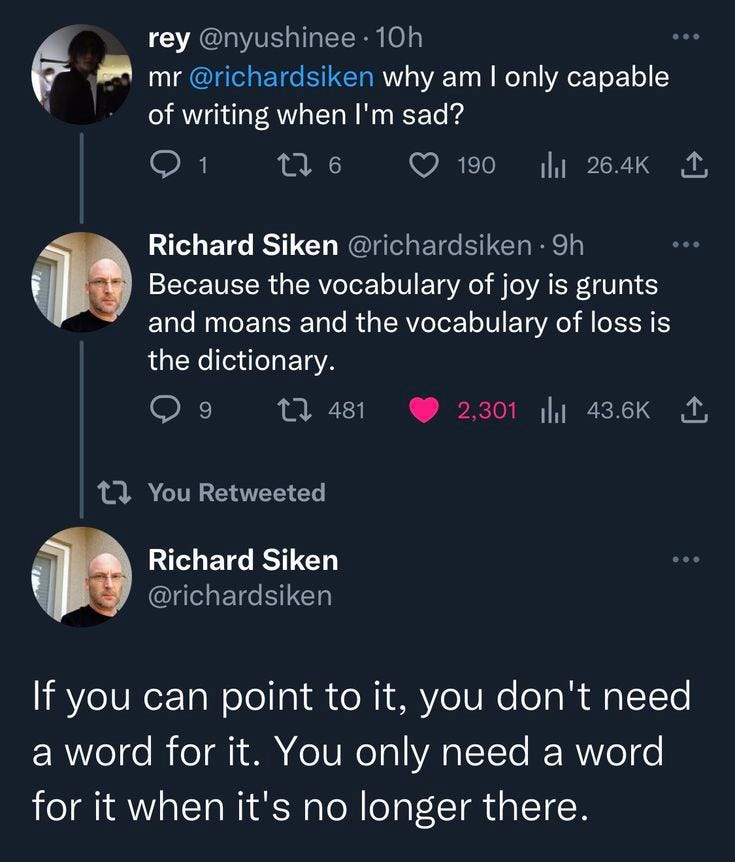
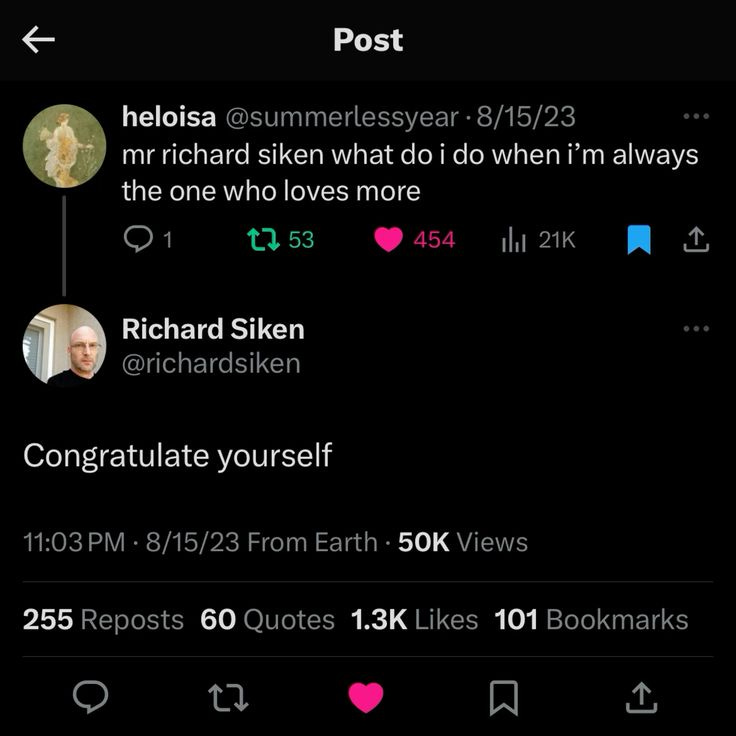
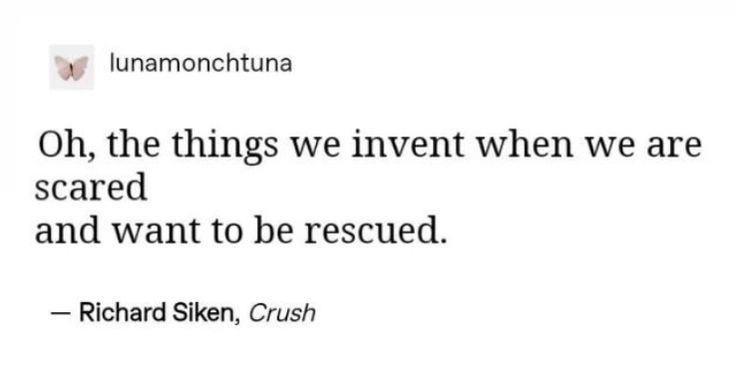
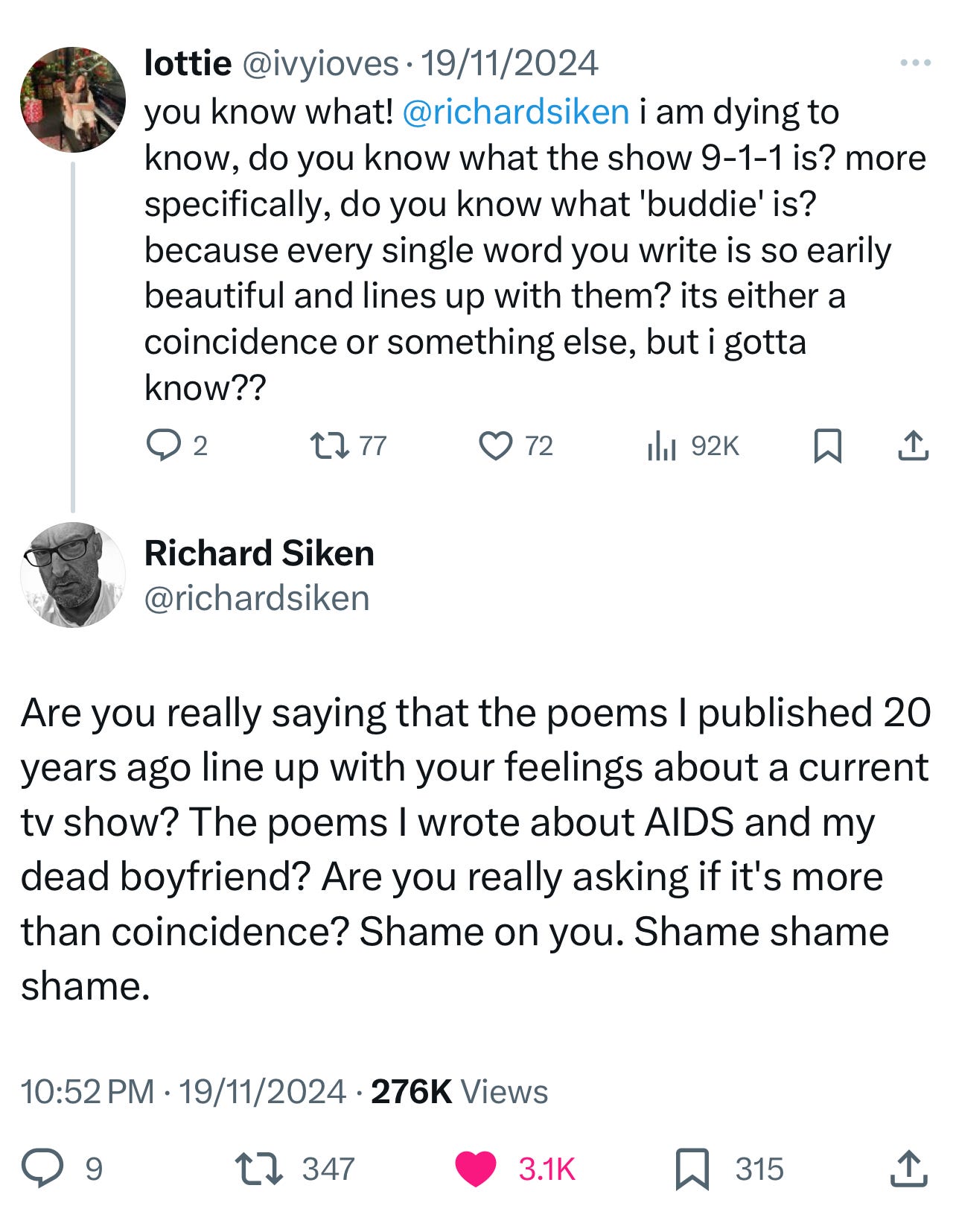
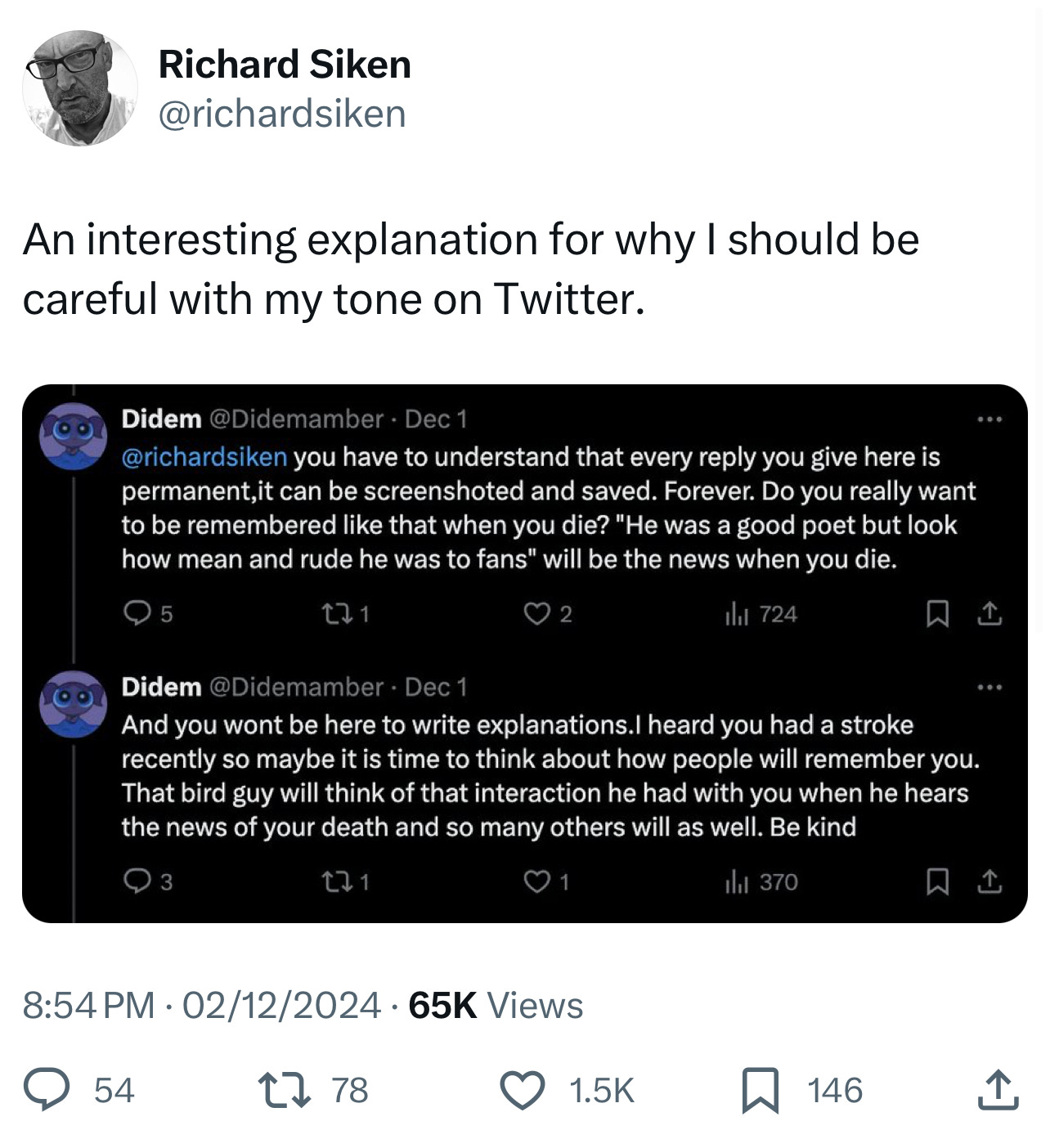
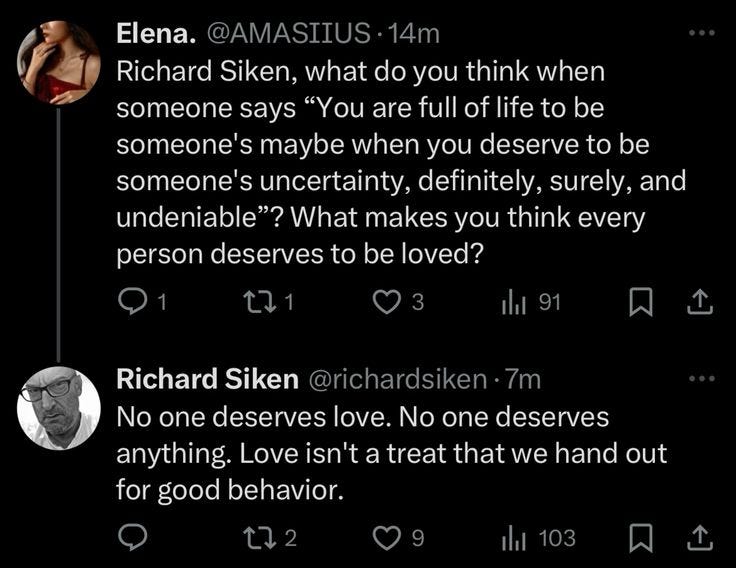
Oh, I loved this piece so much. Your musings on how our society engages with art in the modern era are pretty much spot on. Why go to poetry looking for autobiography? We should go to poetry looking for a feeling, an experience, a story, a truth that might not be The Truth but is still a truth.
Reading this immediately after I wrote a comment talking about how I identified with your work feels like the universe striking me down for my hubris. My bad...